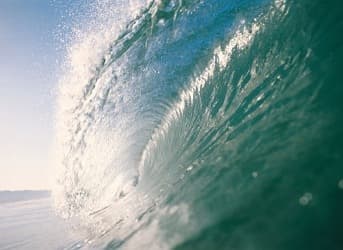While most major economies agree that some form of alternative and renewable resources are needed as part of the emerging energy mix, embracing frontier areas like wave arrays might be more about changing the way decision-makers think about energy than simply about the saving the environment. That's how Richard Yemm, founder of Scottish company Pelamis Wave Power, sees it anyhow. He says efforts underway in Europe aren't just about protecting the environment, they're about new ways to provide energy that make economic sense. He's not, after all, just talking about climate change when he talks about going green.
"The second industrial revolution is well under way in the U.K. and Europe, one which is based on green energy and technology," says Yemm, "and Scotland, which aims to decarbonize its economy, is leading the way in frontier energy developments."
The first industrial revolution was driven by carbon-based energy resources and helped define today's economy, he explained. The second revolution is driven by green technologies. This sector is already big business in Europe and, if First Minister Alex Salmond gets his way, it will help an independent Scotland stand alone in the region.
On the west coast of Scotland, powerful ocean swells roll into shore year round. Because of this, Yemm claims there's enough wave energy to power 100 homes with every step you take along the beach.
"The ocean is like a gigantic battery," he says, "continually being charged by the wind."
Wave power is more reliable and predictable than wind or solar because it's less dependent on the local weather conditions. The waves are always rolling, said Yemm.
Scotland and the rest of the European community understand the risks and opportunities presented by frontier renewable energy technologies like wave power. Several energy companies are already testing his company's Pelamis wave-energy converters and there could be enough of them in the water to generate as much as 200 megawatts of electricity from the waters of Scotland's west coast by the end of the decade. That's not much, says Yemm, but it's a good start for a new energy source that's expected to bring in significant revenue for all players involved, including those outside Europe.
So why is Scotland the model rather than the norm? Yemm says it’s a matter of making alternative energy something more than just an environmental issue. It needs to be something that's on equal footing with the rest of the energy sector. The wind, the sun's rays and waves are just as much a source of energy as oil and natural gas, Yemm explains. It took hundreds of years of technological development to make oil and natural gas inexpensive, though the IEA said the age of cheap conventional energy is likely over.
For most of the rest of the world, the climate change and alternative energy debate isn't at the top of the agenda, however. The United States and Canada, two oil-rich countries in their own right, backed out of the Kyoto Protocol saying, for all intents and purposes, it was an ineffective environmental treaty. But major economies like the United States can push ahead with alternative energy if they decide to put their money where their mouth is in the green energy debate, says Yemm. It just requires a paradigm shift in the way countries look at their available natural resources. It's not, he says, just about environmental stewardship. It's about making a buck along the way too.
"Europe has set targets to decarbonize its economy in a fraction of the time it has taken to create the carbon-based economy," he said. "However, contrary to the common view, it is not looking on this as a noble duty or an unavoidable burden, but as an economic opportunity on a grander scale than the first industrial revolution that created the requirement for it."
By. Daniel J. Graeber of Oilprice.com


















